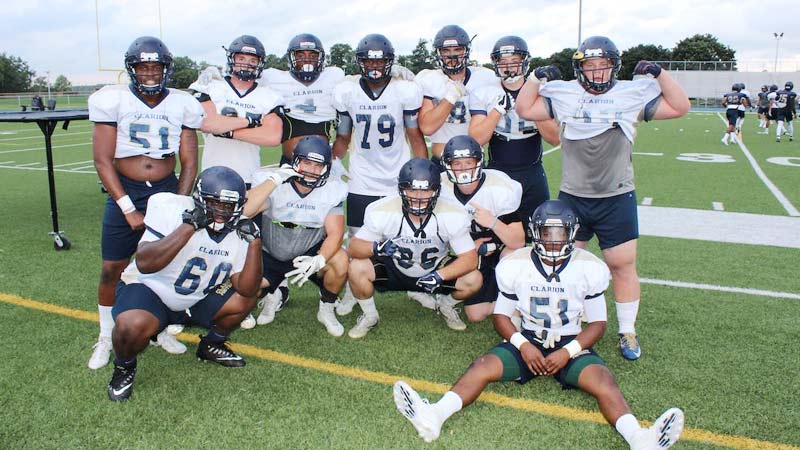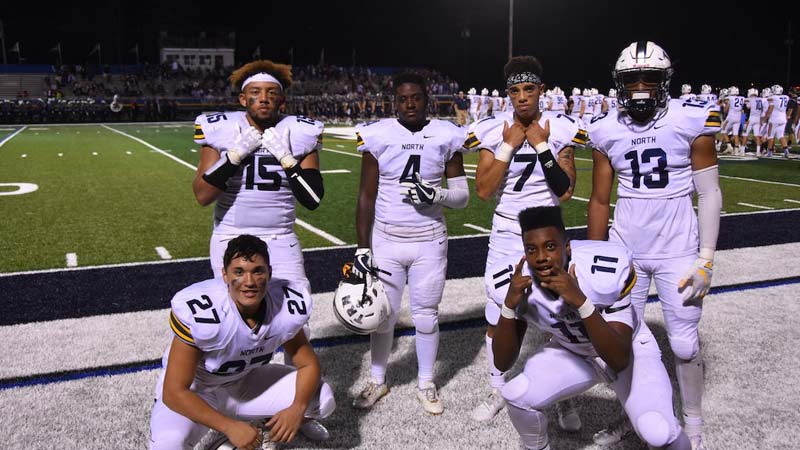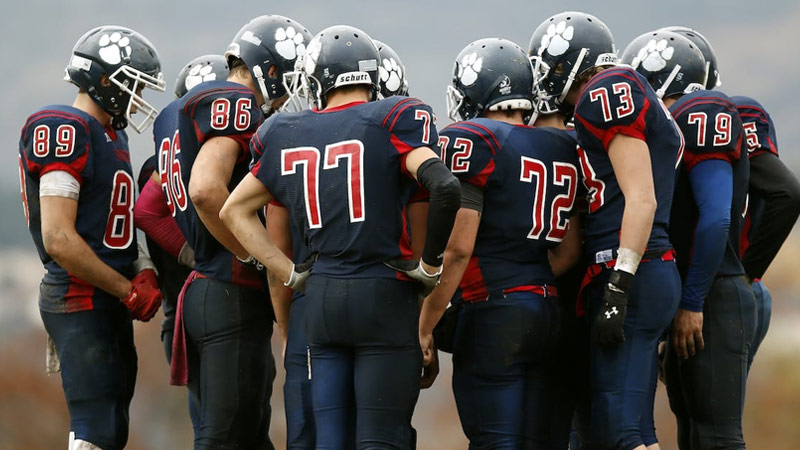NFL jersey numbers are more than just identifiers; they’re badges of honor, symbols of tradition, and windows into a player’s identity. From the early days of American football to the present, these numbers have held a significant place in the hearts of players, fans, and the sport’s rich history.
In this comprehensive guide, we delve into the intriguing world of NFL jersey numbers. You will also learn the meanings of every single jersey number in football.
Get ready to uncover the meaning behind each range, explore frequently asked questions, and gain insights into how these numbers shape the game we love.
Why Do NFL Players Jerseys Have Significant Numbers?
NFL players wear significant jersey numbers often based on their preferred positions or to honor role models. These numbers carry personal and historical significance, creating a unique identity and fostering a sense of tradition and connection within the team and the sport’s history.
Tradition and Legacy
Many players choose jersey numbers that hold personal or familial significance. They might want to honor a family member, a role model, or a number they wore in their youth or college career.
Position and Identity
In the past, specific jersey number ranges were associated with certain positions. This helped fans, coaches, and players quickly identify a player’s role on the field. While these associations are not as strict as before, they still play a role in shaping a player’s identity.
Superstition
Athletes, like many people, can be superstitious. They might believe that wearing a particular number brings them luck or influences their performance positively.
Recognition
Unique or iconic jersey numbers can help players stand out and be easily recognizable to fans and spectators.
Personal Preferences
Some players simply have preferences for certain numbers. These preferences can be based on how the numbers look, and sound, or even on their personal history.
Marketing and Branding
Players may choose numbers that align with their personal brand or marketability. A memorable number can be associated with a player’s merchandise and fan appeal.
Retired Numbers
In some cases, jersey numbers are retired by teams in honor of legendary players who wore those numbers. This adds to the historical significance of certain numbers within the franchise.
Locker Room Identity
Jersey numbers can contribute to a player’s identity within the team’s locker room culture. It’s a way for teammates to refer to and bond with each other.
Fan Connection
Fans often associate certain numbers with specific players they admire. Replicating a favorite player’s number can help fans feel a stronger connection to a current player.
Team History
Some players choose jersey numbers to connect with the history of their team, paying homage to the great players who came before them.
Ultimately, the significance of jersey numbers varies from player to player. They are a personal choice that can be based on a mix of emotional, practical, and aspirational factors.
NFL Jersey Numbers List: At A Glance

Here’s a table listing NFL jersey numbers typically worn by American football players and the positions associated with those numbers.
Keep in mind that while certain positions are traditionally associated with specific jersey number ranges, NFL players can sometimes choose numbers outside of these ranges due to recent rule changes. These changes allow more flexibility in jersey number assignments.
| Jersey Number Range | Position(s) |
| 1–19 | Quarterback, Kicker, Punter |
| 20–49 | Running Back, Defensive Back |
| 50–59 | Linebacker |
| 60–79 | Offensive Lineman |
| 80–89 | Wide Receiver, Tight End |
| 90–99 | Defensive Lineman |
What Do the NFL Jersey Numbers Determine?
NFL jersey numbers hold significant meanings that go beyond just identification. Here’s a more detailed explanation of the meanings associated with different jersey number ranges:
Quarterbacks and Specialists (1-19)
Quarterbacks, kickers, and punters often wear single-digit or low-teen numbers.
These numbers symbolize their leadership roles, being the on-field generals, and their ability to remain calm under pressure during critical moments of the game.
Running Backs and Defensive Backs (20-49)
This range includes players who are versatile and often involved in both offensive and defensive plays. Numbers in this range may hold personal meaning or reflect admired players.
For instance, a running back might choose a number associated with a childhood hero.
Linebackers (50-59)
Linebackers wear numbers that indicate their position as a physical and impactful force on the field.
These numbers are often seen as representing toughness and hard-hitting plays in the heart of the defense.
Offensive Linemen (60-79)
These numbers are worn by the unsung heroes of the team, the offensive linemen. They symbolize teamwork, unity, and the foundation of the team’s success.
Offensive linemen work together to protect the quarterback and create openings for running plays.
Wide Receivers and Tight Ends (80-89)
These numbers represent agility and skill in catching passes. Wide receivers and tight ends often wear numbers that align with their style of play—quick and precise for wide receivers, and versatile and dependable for tight ends.
Defensive Linemen (90-99)
This range is reserved for the players who dominate the line of scrimmage. Defensive linemen wear these numbers to signify their strength, and ability to disrupt plays, and pressure the opposing team’s offense.
Personal Significance
Some players choose jersey numbers that have personal significance, such as their birthdate, a number from their childhood, or a number associated with an important event in their lives.
Honoring Role Models
Players might wear specific numbers to pay tribute to their sports idols or family members who supported their journey. It’s a way of showing respect and acknowledging those who inspired them.
Legacy and Tradition
Certain jersey numbers become iconic due to legendary players who wore them. By choosing these numbers, current players aim to carry on the legacy and uphold the expectations associated with that number.
Spiritual or Cultural Beliefs
Some players choose numbers based on spiritual beliefs, cultural significance, or personal superstitions that hold meaning to them. This can be a reflection of their identity and values.
NFL jersey numbers are a canvas for players to express their identity, values, and connection to the game. Each number range carries a unique symbolism, contributing to the rich tapestry of the sport’s history and culture.
Significance of NFL Jersey Numbers

NFL jersey numbers hold various significances that go beyond mere identifiers. They serve as symbolic representations of a player’s role, personality, and connection to the sport’s history. Here’s a deeper look into the significance of NFL jersey numbers:
Positional Identity
Jersey numbers often correlate with a player’s position on the field. This allows fans, coaches, and teammates to quickly identify a player’s role and responsibilities.
For instance, low numbers are often associated with quarterbacks, reflecting their leadership.
Historical Legacy
Certain jersey numbers have become iconic due to legendary players who wore them. Players who choose these numbers aim to honor that legacy and live up to the standards set by those who came before them.
Personal Expression
Players select jersey numbers that hold personal meaning, reflecting their identity, values, and experiences.
This choice allows them to express themselves and connect with their fans on a deeper level.
Motivation and Inspiration
A jersey number can serve as a constant reminder of a player’s goals and motivations. It can push them to work harder, perform better, and strive for excellence.
Fan Connection
Fans often develop attachments to players and their jersey numbers. Wearing a favorite player’s number can create a strong emotional bond between fans and the athlete, fostering a sense of loyalty and support.
Team Unity
Jersey numbers contribute to a sense of unity within the team. Players wearing similar numbers often share positions or roles, creating a bond and facilitating communication on the field.
Tradition and Ritual
Jersey numbers carry forward the traditions and rituals of the sport. Players wearing certain numbers become part of a lineage, embracing the history and culture of the game.
Storytelling
Each jersey number has a story behind it, whether it’s about the player’s journey, influences, or achievements. These stories add depth to the player’s narrative and the overall lore of the sport.
Marketability and Branding
Jersey numbers become part of a player’s brand. Fans associate certain numbers with specific players, enhancing their marketability through merchandise and endorsements.
Superstitions
Players might develop superstitions around their jersey numbers, believing that wearing a particular number brings luck or positive energy, which can impact their performance.
Community Engagement
Players often use their jersey numbers as a way to engage with their communities. They might host events, donate to charities, or involve fans in activities related to their numbers.
Recognition and Identity
A player’s jersey number is often a key factor in their recognition and identification both on and off the field. It becomes a symbol of their presence in the NFL world.
NFL jersey numbers encapsulate a player’s essence, connecting them to their position, team, fans, and the broader history of the sport. These numbers hold layers of meaning that contribute to the rich tapestry of American football culture.
Essential Facts of NFL Jersey Numbers
Here are some essential facts about NFL jersey numbers:
- Jersey numbers are typically organized into ranges based on player positions. These ranges help identify players’ roles on the field quickly.
- Jersey numbers often indicate a player’s position. For instance, quarterbacks and kickers generally wear numbers from 1 to 19, while offensive linemen wear numbers in the 60s and 70s.
- Some numbers have gained historical significance due to legendary players who wore them. Players may choose these numbers to honor the past and carry on the tradition.
- In 2021, the NFL expanded jersey number options for various positions, allowing more flexibility. For example, wide receivers can now wear numbers from 1 to 49, in addition to 80 to 89.
- Players sometimes change numbers when they join a new team, switch positions, or want a fresh start. Such changes can lead to fans purchasing updated jerseys.
- Some teams retire jersey numbers to honor exceptional players. This means no other player on the team can wear that number, preserving its legacy.
- Players often choose numbers with personal significance, such as their birthdate, a lucky number, or to honor a family member.
- Popular players’ jersey numbers are in high demand among fans, contributing to their marketability and the league’s revenue.
- The NFL has specific rules regarding which positions can wear which numbers. This helps officials and fans quickly identify players and their roles.
- Team captains sometimes wear the jersey with a “C” patch to signify their leadership role. This is in addition to their regular jersey number.
- Teams occasionally wear special uniforms, such as throwback jerseys, to honor their history. These jerseys often feature old-style number fonts and designs.
- Fans often form emotional connections to players through their jersey numbers, and wearing a favorite player’s jersey is a way to show support.
- Young players may request jersey numbers worn by their idols, symbolically continuing the legacy of those who inspired them.
- Players may choose numbers that align with their playing style. For instance, a defensive lineman might pick a number that reflects strength and dominance.
- Jersey numbers become part of a player’s identity and help differentiate them in a sport where helmets often hide faces.
These facts showcase how NFL jersey numbers hold both functional and symbolic importance, reflecting the sport’s history, players’ stories, and their connection with fans.
FAQs
Why do NFL players wear specific jersey numbers?
NFL players wear specific jersey numbers to identify their positions, embrace personal significance, honor historical legacies, and establish their own presence on the field.
How are jersey numbers assigned in the NFL?
Jersey numbers are traditionally assigned based on the player’s position. However, recent rule changes (as of 2021) have expanded the options for certain positions, allowing more flexibility in number selection.
What is the significance of retired jersey numbers?
Retired jersey numbers hold a special place in NFL history. Teams retire numbers to honor exceptional players who made a significant impact, and no other player on the team can wear that number again.
What impact do jersey numbers have on player branding?
Jersey numbers play a crucial role in player branding. Popular players’ jersey numbers are often sought after by fans, leading to increased merchandise sales and enhancing the player’s marketability.
How do jersey number changes affect players and fans?
Jersey number changes can impact players by allowing them a fresh start or signaling a new role. For fans, these changes can lead to purchasing updated jerseys to stay connected with their favorite players.
Wrapping Up
As you delve into the world of NFL jersey numbers, you realize they’re far more than just digits stitched onto uniforms. These numbers carry the weight of tradition, the excitement of fandom, and the aspirations of players.
They tell stories of past legends and inspire new generations. From quarterbacks to linemen, each number range forms a distinct chapter in the history of American football.
So, the next time you see a player on the field, remember that their jersey number is a symbol of their position, their journey, and their connection to a sport that has captivated millions for decades.
Have a nice day.







